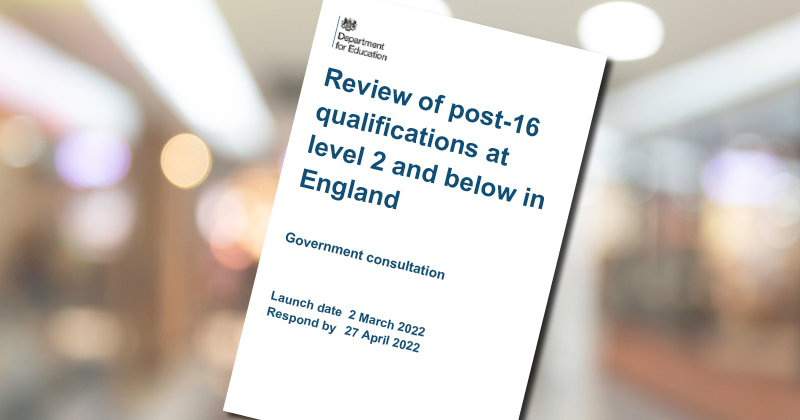Many of the small qualifications the government wants to scrap are the best stepping stones for vulnerable individuals, warns Adrian Grove
The announcement last month of a consultation on technical and academic qualifications at level 2 and below has sent shockwaves across the further education sector.
Claims that the current offering is “too crowded”, with multiple courses covering the same or similar subjects, is extremely short sighted.
Whoever has drawn these conclusions has failed to recognise the range of abilities and experiences of those candidates typically accessing level 2 education.
Put simply, scrapping level 2 qualifications would be a disaster on a national scale.
These qualifications represent the first rung of the career ladder for many people. Why would you take that first step away?
Do those in Whitehall only consider achievement at GCSE level to be the first step?
What about those students for whom GCSEs don’t work?
Should these candidates not access education and opportunity in another way?
Should they really remain unqualified and unemployed instead?
It seems baffling that we must even ask these questions in 2022, when accessibility should be top of the agenda.
It seems baffling we must even ask these questions
Level 2 qualifications allow many individuals a chance to develop their skills from an accessible starting point. This is the place from which these candidates can develop the necessary basic skills and knowledge to gain employment.
The Department for Education proposes a cut of nearly 3,700 level 2 qualifications from the current 8,000 available. Such large-scale reforms will deny entry-level opportunities to learn, train and enter the workforce to thousands of people, of all ages.
It is said that the cuts will remove “the smallest qualifications, where they are unlikely to be able to provide a student with the knowledge, skills and behaviours contained in a relevant employer-led standard, or to provide them with broad content relevant to an occupational route”.
However, the smallest qualifications hold the greatest power as stepping stones for those who may have struggled with formal education in the past.

Whether it was difficulty concentrating or participating in a traditional classroom environment, additional learning needs, difficult personal life, mental health conditions or for any other reason, many individuals find themselves in need of education from the ‘beginning’.
It is these ‘small’ qualifications that may be the key to unlocking job opportunities for those who are too anxious to handle job interviews or phone calls, or who struggle with maths or literacy skills.
This means that the ‘bigger’ qualifications that the government wants to keep are too much of a step up for these candidates.
So a workable alternative for these individuals should be provided. Meanwhile, the restriction of accessible education opportunities in such circumstances may be considered, in my opinion, discriminatory.
It also follows that these level 2 qualifications have a positive impact on lifting people out of poverty. For those who want to work but who cannot access the level 3 courses, provision must be made for training.
It is in the government’s interest to encourage and support people into work, and this is the first step for many into a sustainable career ̶ and later, level 3 training when appropriate. Level 2 provision is therefore crucial in reducing pressure on the benefits system.
The impact on the UK workforce if these first rungs of the career ladder are removed will certainly be felt, particular as many entry-level jobs are struggling to recruit post-Brexit and post-pandemic.
Not only this, but the gap between the qualified and unqualified workforce will leave a severe impression on social mobility and a knock-on effect of increasing the national adult skills gap over time.
The deadline for responses is next week. It is clear to me that this is about as far from the prime minister’s levelling-up pledge as we can get.

















Your thoughts